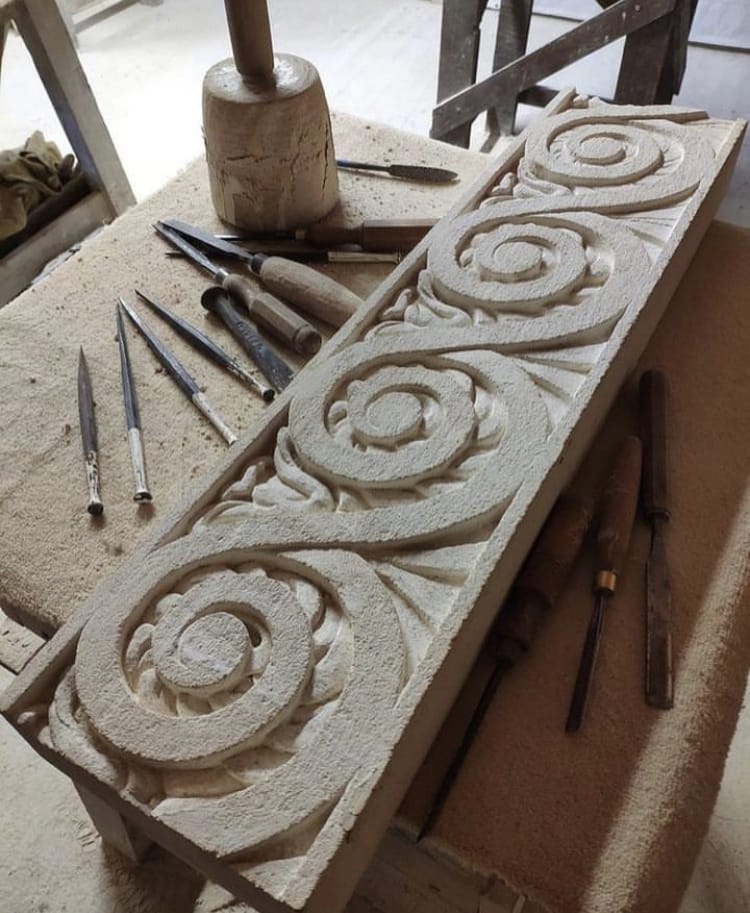The Burden of the Elder: Unburdening the ‘Ring’ of Intangible Knowledge
Delve into the legacy of decades of craftsmanship, blending global insights with timeless stone carving mastery.
Decades of Global Expertise
Harness the profound knowledge gained from working in 48 countries, delivering unparalleled craftsmanship rooted in rich tradition.
A Legacy of Responsibility
Embrace the burden and honour of preserving ancient techniques while inspiring the next generation of stone artisans worldwide.
Timeless Craft, Modern Vision
Experience the fusion of classical artistry with contemporary perspectives, elevating every project beyond mere stonework.

“With them the seeds of wisdom did I sow”
The passage of time is a great accumulator, not just of years, but of intangible knowledge: those life lessons, anecdotal histories, specialized crafts, and unwritten rules learned through experience, observation, and word-of-mouth. This accumulated wisdom, particularly as we enter our later years, begins to bear a striking resemblance to a legendary literary artifact: J.R.R. Tolkien’s One Ring. Like the Ring, this knowledge offers immense power and influence, but simultaneously becomes a perilous burden that must eventually be relinquished or passed on.
The Unrepeatable Lore and the Global Grasp
For the elder who holds knowledge acquired through classical training in a tradition now obsolete and seasoned by working in 48 countries over five decades, the “Ring” takes on a unique density. This isn’t just common life experience; it is a repository of unrepeatable lore.
* The Antiquity of the Craft: The initial, classical training represents an ancient, powerful magic—a foundational understanding of the field that modern methods often ignore or forget. This makes the knowledge feel incredibly valuable, but also extremely fragile in a world that no longer speaks its language. The bearer is the last living link to a bygone era of methodology.
* The Weight of the World: The five decades spent traversing 48 countries means the “Ring’s” power is fused with a staggering volume of cultural nuance, political history, specific regional solutions, and human interaction. This knowledge is not theoretical; it is ground-tested wisdom from nearly every corner of the globe.
* The Siren Song of Possession: This combination—archaic depth plus global breadth—makes the possessiveness particularly strong. The elder knows that no single contemporary education or career path could ever replicate this expertise. It fosters a genuine, paralyzing concern: “How can I possibly transfer five decades of global nuance rooted in a dead methodology?” The fear of misinterpretation or degradation by modern hands becomes the Ring’s greatest defense.
The Corruption of Retention
The most dangerous aspect of the Ring is its seductive call to retention. No one, from Bilbo Baggins to Isildur, gives it up willingly. The Ring whispers, “Keep me.”
Intangible knowledge can exert a similar seductive pull:
* Possessiveness and Ego: The knowledge holder may unconsciously cling to their expertise because it grants them status, relevance, or authority. The thought of passing it on feels like a relinquishing of their identity or their worth in the community—a feeling of “If I pass this on, what good am I?”

* The Desire for Control: For the global expert, the retention is often a matter of quality control. They feel the information is too sacred, too complex, or that no one else is truly worthy or ready to receive the knowledge of 48 different operating environments. This mirrors the Ring’s ability to resist being found, seen, or willingly discarded. The knowledge becomes the ultimate key that only the elder can turn, maintaining their essential presence.
The Quest to Be Rid of It: Finding Mount Doom
The central action of Tolkien’s saga is not to wield the Ring, but to destroy it. The bearer is driven by the profound necessity of being rid of the burden. For the elder, the moral imperative becomes to unburden themselves of the intangible knowledge and ensure its survival beyond their own life.
This process is the equivalent of the hobbits’ perilous journey to Mount Doom:
* Deconstructing the Obsolete: The elder must first find a way to translate the ancient, classical framework into a modern context without stripping its power. This means extracting the principles from the processes—a difficult, self-reflective task that requires dismantling the very mental architecture built over 50 years.
* The Global Archive: The knowledge of those 48 countries must be structured and contextualized—not just what happened, but why it worked in Jakarta and failed in Glasgow. The elder needs a Fellowship—a team or a mentee—to help map this vast, geographical wisdom into transferable lessons.
* The Moment of Sacrifice: The ultimate goal is the transfer of power. The elder must make the conscious sacrifice of their unique status, accepting that the knowledge will now be carried forward by new hands—the Frodo—who will undoubtedly adapt it. It is a profound act of letting go, accepting that the continuity of the craft is more important than the individual’s command of it.
In this light, the greatest heroic act of a uniquely skilled elder is to become a willing Gandalf or Galadriel, assisting in the knowledge’s safe transmission, rather than an obsessed Gollum, clutching the ‘precious’ until the bitter end. The only way to save the ‘Ring’ of wisdom is to ensure it is no longer yours alone.
